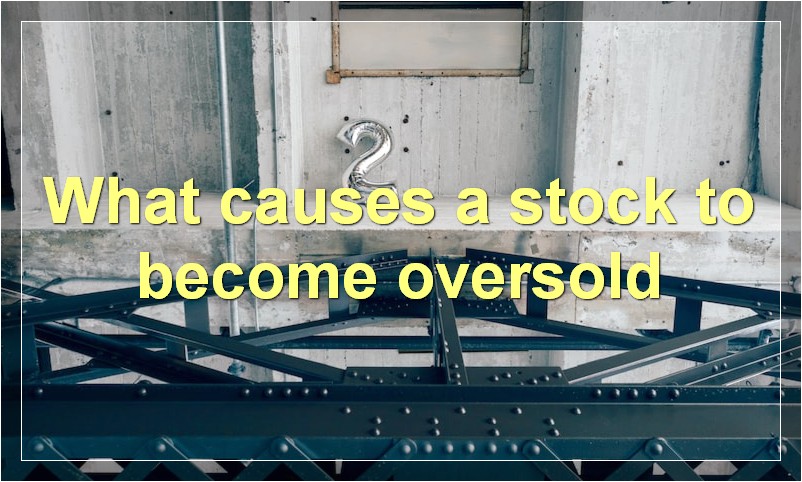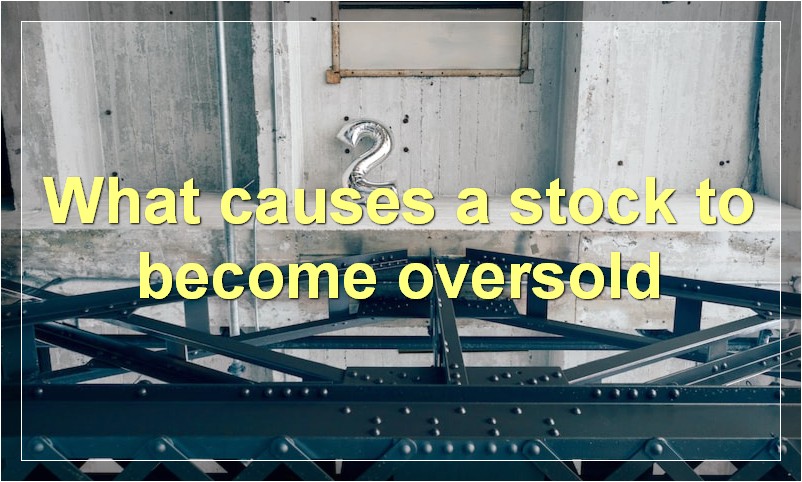If you’re thinking about investing in stocks, you need to know about oversold stocks. These are stocks that are being sold at a lower price than they are actually worth.
What is an oversold stock
An oversold stock is a stock that has been sold more than it has been bought. This can happen for a number of reasons, but typically happens when there is a lot of selling pressure and not enough buying pressure. This can lead to the stock price falling even though there may be no fundamental reason for it to do so. Oversold stocks can be a good opportunity to buy if you believe that the stock price will eventually rebound.
What causes a stock to become oversold

When a stock becomes oversold, it means that it has been sold off more than what is considered normal. This can happen for a variety of reasons, but the most common one is that investors are worried about something happening with the company. It could be that they are worried about the financial stability of the company, or it could be that they are worried about something happening with the management. Whatever the reason, when a stock becomes oversold, it means that there is a lot of selling pressure on the stock.
How can you tell if a stock is oversold
There are a few indicators you can look at to tell if a stock is oversold. One is the Relative Strength Index (RSI). This is a technical indicator that measures the speed and change of price movements. If the RSI is below 30, it means the stock is oversold. Another indicator you can look at is the Stochastic Oscillator. This measures the momentum of price changes. If the stochastic oscillator is below 20, it means the stock is oversold. You can also look at candlestick chart patterns. If there is a hammer or inverted hammer pattern, it means the stock is oversold.
Is an oversold stock a good investment
An oversold stock is a stock that has been sold more than it has been bought. This can happen for a number of reasons, but usually happens when there is a lot of negative news about the company. An oversold stock is often seen as a good investment because it is usually undervalued.
Should you buy an oversold stock
Oversold stocks are securities that are being sold at a lower price than what they are actually worth. This generally happens when investors are panicking and selling off their assets quickly, without considering the long-term effects of doing so. While there may be some risks associated with oversold stocks, they can also offer opportunities for savvy investors to make a profit.
Here are a few things to consider before buying an oversold stock:
1. The reason for the sell-off: It’s important to try to understand why a stock is being sold off so cheaply. If there is a legitimate reason for the sell-off (e.g., the company is experiencing financial difficulties), then it may not be wise to invest in the stock. On the other hand, if the sell-off appears to be due to irrational investor panic, then the stock may be undervalued and represent a good investment opportunity.
2. The company’s financial situation: Even if the sell-off appears to be due to investor panic, it’s still important to evaluate the company’s financial situation before investing. Are they in debt? Do they have enough cash on hand to cover their expenses? Are they profitable? Answering these questions will help you determine whether or not the company is a wise investment despite the current market conditions.
3. Your own risk tolerance: It’s important to know your own risk tolerance before investing in any stock, but it’s especially important when considering oversold stocks. These stocks tend to be more volatile than others, so you need to be comfortable with the idea of potentially losing money in the short-term in order to profit in the long-term. If you can’t stomach that level of risk, then investing in oversold stocks may not be right for you.
Oversold stocks can offer opportunities for investors to make a profit, but there are also risks involved. Before investing in any oversold stock, be sure to do your research and only invest if you’re comfortable with the risks involved.
What is the meaning of an oversold market

An oversold market occurs when prices have fallen sharply and rapidly, and are now considered too low by some measures. This can happen for a variety of reasons, but is often the result of panic selling or a sudden change in market sentiment. When this happens, it can create opportunities for bargain hunters who are willing to buy at what they believe are lower than fair value prices.
What are the dangers of investing in oversold stocks
When it comes to investing in stocks, there is always the risk that the stock might be oversold. This means that the stock is being sold for more than it is actually worth, which can lead to losses for the investor. There are a few different dangers that come with investing in oversold stocks, and it is important to be aware of them before making any investment decisions.
One of the biggest dangers of investing in oversold stocks is that you could end up paying too much for the stock. If you buy a stock when it is oversold, you are essentially paying more than what it is actually worth. This can lead to big losses if the stock price then falls back down to its true value.
Another danger of investing in oversold stocks is that you may not be able to sell the stock when you want to. If everyone is selling the stock because it is oversold, it can be difficult to find a buyer willing to pay the price you are asking. This can leave you stuck holding onto a stock that has lost value, and you may not be able to get out until the price goes back up again.
The best way to avoid these dangers is to do your research before investing in any stock. Make sure you know what the stock is worth, and only invest if you are comfortable with the risks involved. Oversold stocks can be tempting, but they can also lead to big losses if you’re not careful.
How do you trade an oversold stock
When a stock becomes oversold, it means that it has been heavily sold and the price has dropped significantly. This can happen for a number of reasons, including a general sell-off in the market or specific news about the company. Oversold stocks can be a great opportunity for traders because they may be undervalued and have the potential to rebound.
To trade an oversold stock, you need to first identify one that is ripe for a rebound. This can be done by looking at technical indicators such as the Relative Strength Index (RSI) or the Stochastic Oscillator. Once you have found an oversold stock, you need to wait for a confirmation signal before entering a trade. This could be a bullish candlestick pattern or a crossover in the RSI or Stochastic Oscillator. Once you have your confirmation signal, you can enter a long position and hold onto the stock until it rebounds.
What is the best strategy for investing in oversold stocks
There is no one-size-fits-all answer to this question, as the best strategy for investing in oversold stocks will vary depending on the individual investor’s goals and risk tolerance. However, some general tips that may be helpful include studying the fundamentals of the underlying companies, paying attention to market sentiment and technical indicators, and having a well-defined exit strategy.
When is the best time to buy an oversold stock
Oversold stocks are those that have been sold off sharply and are now trading at lower levels than their recent price history. Many investors view oversold stocks as a bargain since they believe the stock is due for a rebound. However, timing the purchase of an oversold stock is tricky since it’s difficult to know how long the selling pressure will continue. As a result, investors need to be careful when buying oversold stocks and should always use stop-loss orders to protect themselves from further losses.

